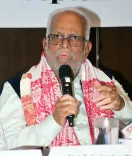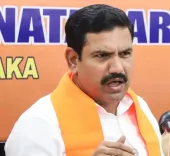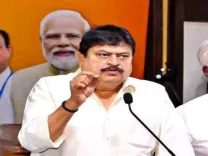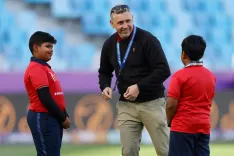Who Were the Legends Honored at the Padma Ceremony?
Synopsis
Key Takeaways
- 68 individuals were honored at the Padma Awards ceremony.
- The awards recognize contributions in art, literature, education, and more.
- Posthumous awards were given to several legends, ensuring their legacies live on.
- 23 of the awardees were women, highlighting female excellence.
- The government aims to democratize the Padma Awards, celebrating unsung heroes.
New Delhi, May 27 (NationPress) At a magnificent gathering hosted at Rashtrapati Bhavan, President Droupadi Murmu awarded the Padma Awards to 68 distinguished individuals who have made remarkable contributions across various fields including art, literature, education, public affairs, medicine, social work, science, sports, and industry. This prestigious event, which saw the presence of Prime Minister Narendra Modi, Home Minister Amit Shah, External Affairs Minister S. Jaishankar, and numerous other dignitaries, represented the second segment of the 2025 Padma Awards ceremony.
The Padma Awards, regarded as one of India's highest civilian accolades, are divided into three distinct categories: Padma Vibhushan, Padma Bhushan, and Padma Shri. The government had previously announced a total of 139 awardees on the eve of Republic Day this year.
Among the honorees in this segment, there were 3 Padma Vibhushan, 9 Padma Bhushan, and 56 Padma Shri recipients. The ceremony held a unique significance with 13 posthumous recognitions, paying tribute to legends who have left an indelible mark in their respective fields.
A particularly poignant moment occurred when the Padma Vibhushan was awarded posthumously to the late Bhojpuri and folk singer Dr. Sharda Sinha, whose music deeply resonated with the heart of India. Her son, Anshuman Sinha, accepted the award on behalf of the legendary singer celebrated for her devotional and Chhath songs.
Other esteemed Padma Vibhushan recipients included former Chief Justice of India Jagdish Singh Khehar and classical dancer Kumudini Lakhia (posthumous).
The Padma Bhushan awardees featured social activist Sadhvi Ritambhara, notable for her involvement in the Ram Janmabhoomi movement, actor-politician Nandamuri Balakrishna, and acclaimed journalist and author A. Surya Prakash. Among the posthumous Padma Bhushan recipients were iconic singer Pankaj Udhas, veteran politician Manohar Joshi, economist Bibek Debroy, celebrated Malayalam writer M.T. Vasudevan Nair, and Japanese industrialist Osamu Suzuki, recognized for his significant partnership with India.
The largest portion of awards this year fell under the Padma Shri category, where 57 individuals were honored for their grassroots innovations and contributions throughout the nation. Notable names included playback singer Arijit Singh, cricketer R. Ashwin, author Pratibha Satpathy, former SBI Chairperson Arundhati Bhattacharya, and violinist Tejendra Narayan Majumdar. The list also recognized foreign nationals, NRIs, PIOs, and OCIs—ten in total—demonstrating India's appreciation of global contributions.
Of particular note, 23 awardees were women, highlighting the rising acknowledgment of female excellence across various sectors. The Padma Awards persist in honoring unsung heroes—many of whom hail from remote locales—who have made substantial contributions without pursuing recognition.
This year’s ceremony embodies the ethos of “nation first, people first”, with recipients reflecting India's cultural, scientific, and humanitarian diversity. The government's initiative to democratize the Padma Awards has transformed them into a genuine people's honor, celebrating not only fame but also meaningful service.






